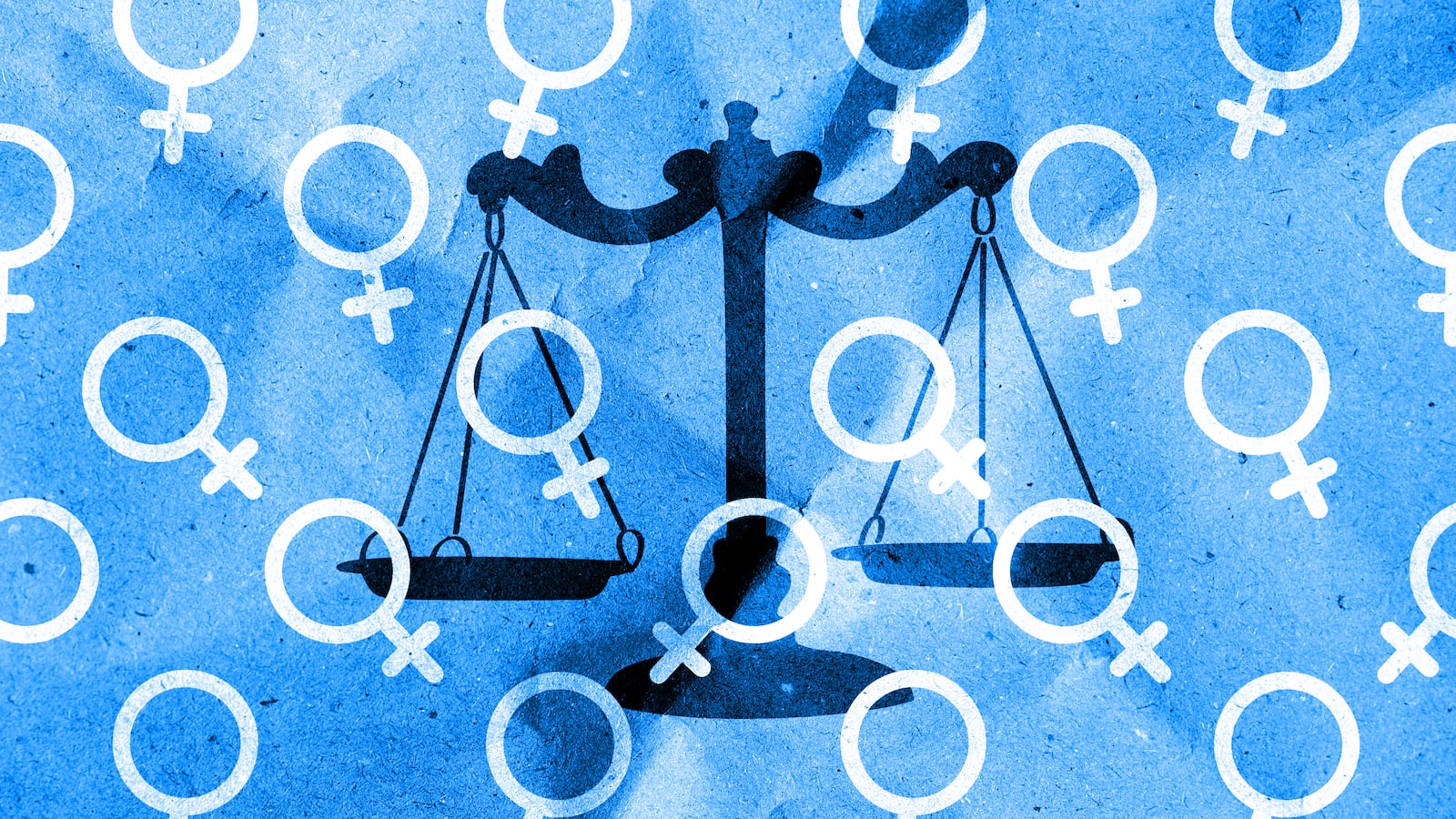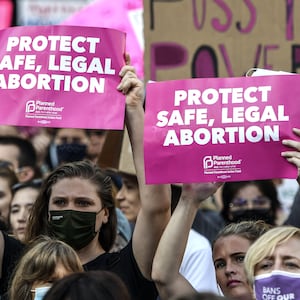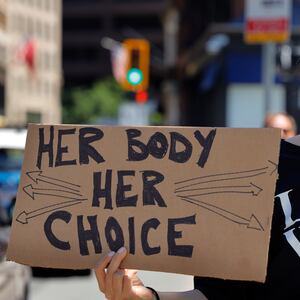In Arizona, the U.S. Supreme Court’s decision last Friday to end the right to an abortion had an immediate effect: within 24 hours, Planned Parenthood had suspended all abortion procedures in its clinics around the state.
That’s because Arizona is one of five states with a law banning abortion before Roe v. Wade was decided in 1973. In March of 2022, Arizona Republicans passed a new law banning abortion after 15 weeks—with no exceptions for rape or incest—that is scheduled to go into effect by September.
There is considerable confusion in Arizona as to what the exact legal restrictions on abortion will be going forward. But the state’s 7 million residents are on track to be subjected to some of the strictest abortion laws in a post-Roe America—unless something changes.
Kris Mayes is angling to be that something. A former Republican and longtime consumer lawyer, Mayes is the presumptive Democratic candidate for attorney general in Arizona, a formerly conservative stronghold that has emerged as one of the country’s top battleground states.
If Mayes wins, she has committed to not enforcing the state’s abortion law—whatever it may be come January 2023. She has vowed that no woman or medical professional will be prosecuted for receiving or providing an abortion, and she would use her authority as attorney general to rein in county-level prosecutors who might want to act differently.
Abortion rights, Mayes told The Daily Beast, have quickly become the No. 1 issue in the attorney general’s race. Talking about abortion since Friday’s ruling—and since a seismic leak of a draft opinion in May that presaged it—her message to voters has been simple.
“The way that Arizonans can restore and retain their right to bodily autonomy is by electing me attorney general,” Mayes said. “It has come down to that.”
Mayes is hardly the only attorney general candidate making that pitch. Arizona is just one of nearly two-dozen states where abortion restrictions or bans were automatically set in motion when Roe v. Wade was overturned by the Supreme Court.
Several of those states are among the nation’s most contested battlegrounds—like Wisconsin, Georgia, and Michigan—where Democratic attorneys general and candidates for the office have all committed to not enforcing their states’ abortion restrictions.
In Wisconsin and Michigan, which both have abortion bans on the books, incumbent attorneys general Josh Kaul and Dana Nessel have already committed to not enforcing those bans, both now and if elected for additional terms in November. In Georgia, Democratic nominee Jen Jordan has committed to doing the same.
The Supreme Court’s decision to invalidate abortion rights nationwide and leave it to states to determine abortion access has added a new and urgent dimension to hundreds of races for governor and state legislatures around the country this fall.
Nationwide, Democrats and Republicans will now be battling even harder to win those races so they can write and approve laws either protecting or curtailing abortion access in their states.
But in 2022, attorney general races—usually comparatively sleepy affairs—could be more intense and more important than ever: Attorneys general could play a crucial role in determining how abortion laws are enforced.
“AGs across the country, especially in states like Arizona that have outlawed abortion, are going to be on the front lines of trying to retain access to reproductive care,” Mayes told The Daily Beast.
The strong Democratic election year of 2018, which propelled Democrats into statewide office in Michigan and Wisconsin, has been the backstop preventing pre-existing abortion bans in those states from immediately taking effect after the fall of Roe.
It didn’t take much time for nearby Ohio to demonstrate what would have happened if those elections had gone differently. After the court overturned Roe, Attorney General Dave Yost, a Republican, immediately filed a motion in Ohio federal court asking to remove an injunction blocking the state’s six-week abortion ban.
That legislation, among the most draconian in the country, had been blocked since its passage in 2019. By 6 p.m. Friday evening, Yost tweeted out that the injunction was lifted and the heartbeat ban was law.
Democrats believe these stark examples of the impact of an attorney general’s authority could inspire voters who favor abortion rights to vote for like-minded candidates in November. Emily Trifone, the deputy communications director of the Democratic Attorneys General Association, argued that the majority of voters agree with the Roe status quo.
“At DAGA, we’re going to fight like hell to ensure voters turn out to elect reproductive rights champions to AG offices and beat Republicans who want to drag us backwards,” Trifone said.
For years, Republicans have been eager to implement and run on anti-abortion policy, but the fall of Roe immediately raised the stakes of those moves. Democrats believe Republicans will face political blowback as their long-held positions finally become the law of the land in many places.
Nearly all GOP candidates for attorney general have embraced the high court’s ruling. Some have harshly attacked their Democratic rivals, especially those who still have to win competitive primaries. But many leading Republican candidates aren’t exactly calling abortion the “number one” issue of 2022.
Andrew Gould, a former Arizona state Supreme Court justice running in a crowded GOP primary, defended Arizona Republicans’ 15-week abortion law but emphasized several times that the top issue in the race is securing the U.S. border with Mexico.
Pressed on whether he would make prosecuting violations of Arizona’s abortion law a priority as attorney general, Gould declined to entertain the question.
“I don’t get to pick and choose which laws I enforce,” Gould told The Daily Beast. “I have to enforce those when there’s sufficient evidence to prosecute crimes, I’m not going to pick and choose certain crimes over others.”
In Wisconsin, abortion was banned in 1849, with an exception for saving the life of the mother. That law has not truly been tested in court in modern times, but abortion is considered to be effectively illegal in the state as of Friday.
Eric Toney, a county district attorney seeking to run against Kaul, blasted the incumbent Democrat’s commitment to “not to use any of our resources, either to investigate or prosecute anybody for violations of a 19th-century abortion ban.”
Toney alleged that Kaul “wants to pick and choose which laws to follow and which to ignore” and “has failed the fundamental requirement of serving as attorney general.”
In Michigan, abortion was banned in 1931, and that policy would take effect immediately if a court injunction blocking that ban is removed. Lawyer Matthew DePerno, who made his name calling for a “forensic audit” of the 2020 election results, is the presumptive GOP candidate to take on Nessel in November.
In response to an inquiry from The Daily Beast, DePerno claimed Nessel is “not a serious person” and attacked her position on abortion. He did not respond twice to a question about how aggressively he would enforce Michigan’s existing abortion law. In a statement released on Friday, he said he would “uphold the Constitution and the laws of our country.”
After the court’s ruling was released, Nessel confirmed she will “not prosecute women, girls, or their doctors for seeking or providing abortion services… nor will my staff seek licensure discipline against medical professionals who safely perform these procedures.”
In Georgia, GOP Gov. Brian Kemp—who is running for reelection this year—signed a bill in 2019 banning abortion after six weeks of pregnancy. It was struck down by a federal judge in 2021, but with the fall of Roe, GOP Attorney General Chris Carr moved quickly to put a reconsideration of the law before a federal appeals court.
Jordan, a state senator who is running against Carr, told reporters on a Monday press call that she believes Kemp’s law is “unconstitutional.” If elected in November, Jordan said she would decline to defend it against any legal challenges—something that is typically a core, high-profile responsibility of a state attorney general.
When asked by The Daily Beast, Jordan also confirmed she would not spend any time or resources, if elected, enforcing Georgia’s abortion laws if they remain on the books.
“If it remains how it is now,” she said, “no, we would not.”
Since Friday, Democratic officials in Washington have received criticism, particularly from the progressive wing of the party, for responding to the Roe reversal by telling the public that the solution to the full-scale rollback of abortion rights is to vote in greater numbers. Even a better-than-expected midterm performance almost certainly wouldn’t yield the sorts of majorities Democrats would need to codify abortion rights in Congress.
But in the states, Democrats are hoping that voters and donors will turn their focus away from Washington—something that has not always been easy for the party—and pour resources and energy into winning the downballot races that could decide the future of abortion access in America.
“State elections are where the battle is. At the end of the day, the Supreme Court has sent it back home to us, and so if people are outraged and if people are scared… then they have to vote,” Jordan told reporters.
“We have no other avenue except for people getting out and changing people who are in these offices, because quite frankly, people in these offices are why we’re here in the first place.”










